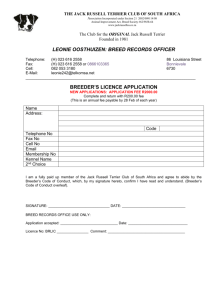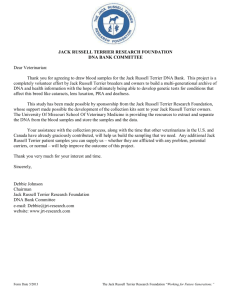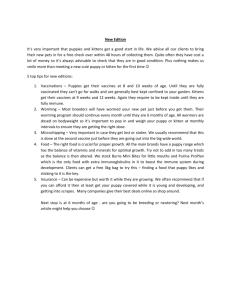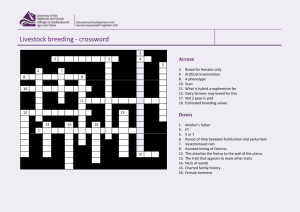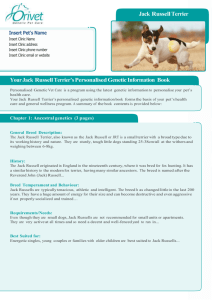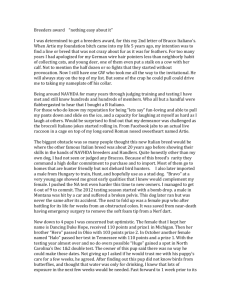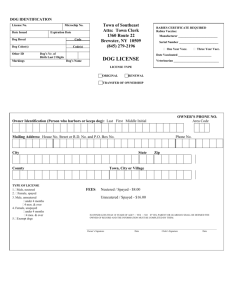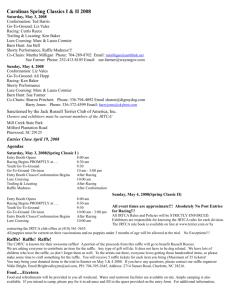January Newsletter - NEW PUPPY & THE JACK RUSSELL TERRIER
advertisement
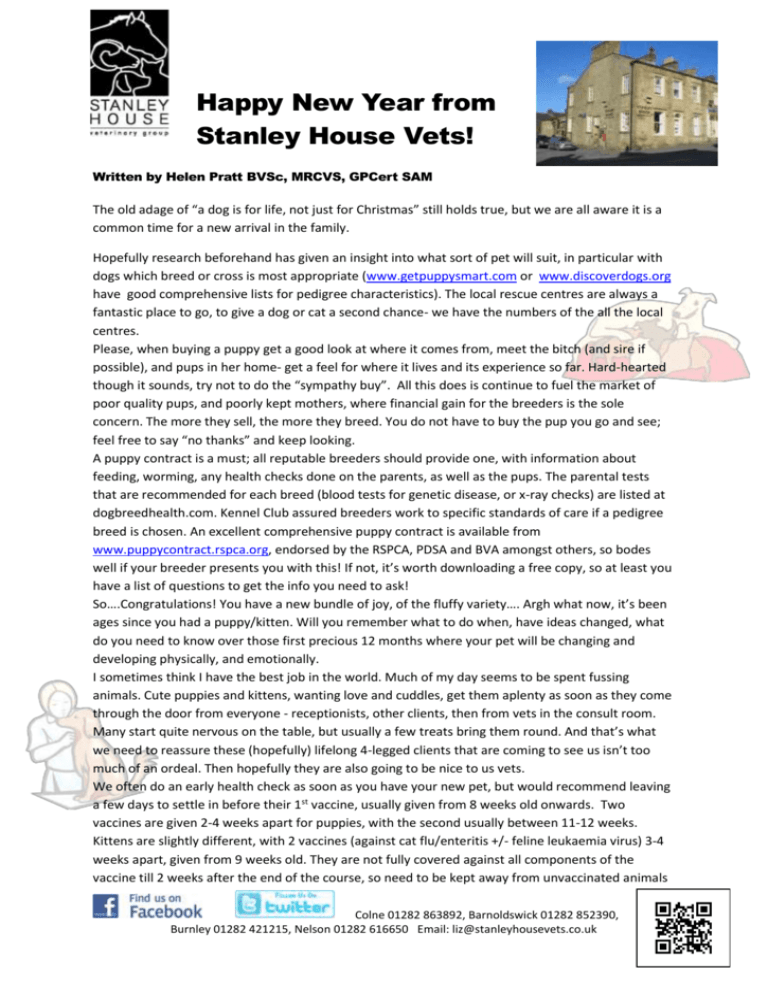
Happy New Year from Stanley House Vets! Written by Helen Pratt BVSc, MRCVS, GPCert SAM The old adage of “a dog is for life, not just for Christmas” still holds true, but we are all aware it is a common time for a new arrival in the family. Hopefully research beforehand has given an insight into what sort of pet will suit, in particular with dogs which breed or cross is most appropriate (www.getpuppysmart.com or www.discoverdogs.org have good comprehensive lists for pedigree characteristics). The local rescue centres are always a fantastic place to go, to give a dog or cat a second chance- we have the numbers of the all the local centres. Please, when buying a puppy get a good look at where it comes from, meet the bitch (and sire if possible), and pups in her home- get a feel for where it lives and its experience so far. Hard-hearted though it sounds, try not to do the “sympathy buy”. All this does is continue to fuel the market of poor quality pups, and poorly kept mothers, where financial gain for the breeders is the sole concern. The more they sell, the more they breed. You do not have to buy the pup you go and see; feel free to say “no thanks” and keep looking. A puppy contract is a must; all reputable breeders should provide one, with information about feeding, worming, any health checks done on the parents, as well as the pups. The parental tests that are recommended for each breed (blood tests for genetic disease, or x-ray checks) are listed at dogbreedhealth.com. Kennel Club assured breeders work to specific standards of care if a pedigree breed is chosen. An excellent comprehensive puppy contract is available from www.puppycontract.rspca.org, endorsed by the RSPCA, PDSA and BVA amongst others, so bodes well if your breeder presents you with this! If not, it’s worth downloading a free copy, so at least you have a list of questions to get the info you need to ask! So….Congratulations! You have a new bundle of joy, of the fluffy variety…. Argh what now, it’s been ages since you had a puppy/kitten. Will you remember what to do when, have ideas changed, what do you need to know over those first precious 12 months where your pet will be changing and developing physically, and emotionally. I sometimes think I have the best job in the world. Much of my day seems to be spent fussing animals. Cute puppies and kittens, wanting love and cuddles, get them aplenty as soon as they come through the door from everyone - receptionists, other clients, then from vets in the consult room. Many start quite nervous on the table, but usually a few treats bring them round. And that’s what we need to reassure these (hopefully) lifelong 4-legged clients that are coming to see us isn’t too much of an ordeal. Then hopefully they are also going to be nice to us vets. We often do an early health check as soon as you have your new pet, but would recommend leaving a few days to settle in before their 1st vaccine, usually given from 8 weeks old onwards. Two vaccines are given 2-4 weeks apart for puppies, with the second usually between 11-12 weeks. Kittens are slightly different, with 2 vaccines (against cat flu/enteritis +/- feline leukaemia virus) 3-4 weeks apart, given from 9 weeks old. They are not fully covered against all components of the vaccine till 2 weeks after the end of the course, so need to be kept away from unvaccinated animals Colne 01282 863892, Barnoldswick 01282 852390, Burnley 01282 421215, Nelson 01282 616650 Email: liz@stanleyhousevets.co.uk and remain indoors until this time. Worming is recommended every month until six months old, then every 3 months. Microchipping will soon be a legal requirement- we are still offering this at a discounted price of £12.50, and carry out generally from 2nd vaccine onwards. We provide full veterinary advice and support over these months - we recommend visiting our fully qualified nursing staff, who provide a FREE clinic, every month until 6 months old then every 3 months until their 1st annual vaccine is due ( usually around 15months old). They offer regular weight checks, and guidance on worming, flea treatments and neutering, as well as advice on toilet training, socialisation and behaviour. We are also able to offer a NEW service of Puppy Socialisation Parties, with 3 weekly sessions starting 1st February, open to all Stanley House clients, with informative speakers, allowing a positive early socialisation experience for you and your pup to enjoy. Please contact our team for more details. AND ENJOY!!!!! If we can help, let us know….. Breed Corner: The Jack Russell Terrier A fun, tough little terrier, descended from a dog bred by a hunting parson¸ Reverend John Russell in the 1800’s to bolt foxes from their holes. White is the predominant colour, bred so they were easily distinguished from their quarry, with black, tan, or both in addition to white, and coat type of rough, broken-coated and smooth. The Jack Russell is considered to be a working-type of terrier, with a variety of types, so the Kennel Club-recognised Jack Russell is the Parson Russell terrier, with a specified breed standard and considered to be slightly longer legged than the average Jack Russell. A cheery, devoted, obedient yet spirited little character, they have a strong and fearless hunting instinct. As long as given plenty of exercise and given definite rules to ensure they do not get ideas above their station, they will make a good family pet for older children, being very bright and enjoying play and training. They are prone to “small dog syndrome”, and are best with plenty of early socialisation training with other dogs. They are generally a healthy little breed compared with others, with a good long lifespan, and few genetic issues; Primary lens luxation, where the lens of the eye becomes displaced from its position behind the pupil, is the most common hereditary disease, and can lead to glaucoma, a painful build up of pressure in the eye. There is a DNA health test available for screening for this disease, so ask your potential breeder if the parents have both been tested. Late onset ataxia (a progressive brain disease causing wobbliness) is another heritable disease for which DNA screening is available. Luxating patella (dislocating kneecap) is a fairly frequent finding which may or may not be clinically significant, from an incidental finding at the vets, an occasional bunny hop, to marked lameness requiring surgery. Other issues include Legg-Calve-Perthes disease (diseased femoral head causing hind limb lameness), deafness (in white dogs), myasthenia gravis and epilepsy, but all these are uncommon to very rare; on the whole the Jack Russell/Parson Russell terrier is a pretty good healthy choice!! Colne 01282 863892, Barnoldswick 01282 852390, Burnley 01282 421215, Nelson 01282 616650 Email: liz@stanleyhousevets.co.uk
